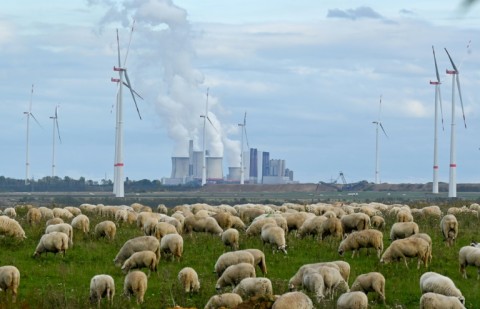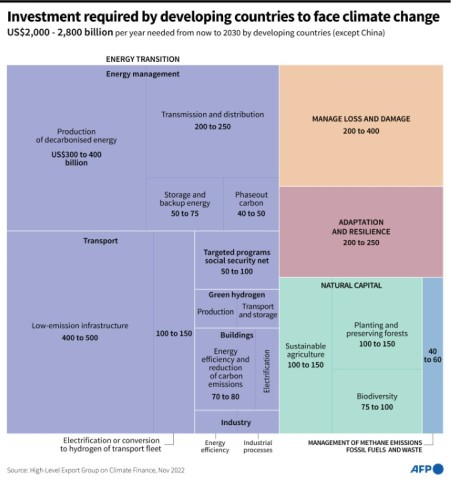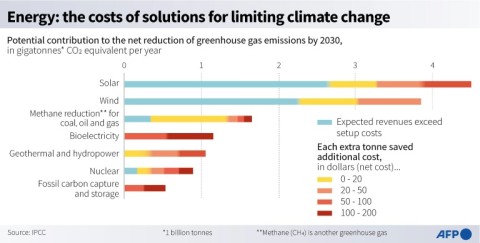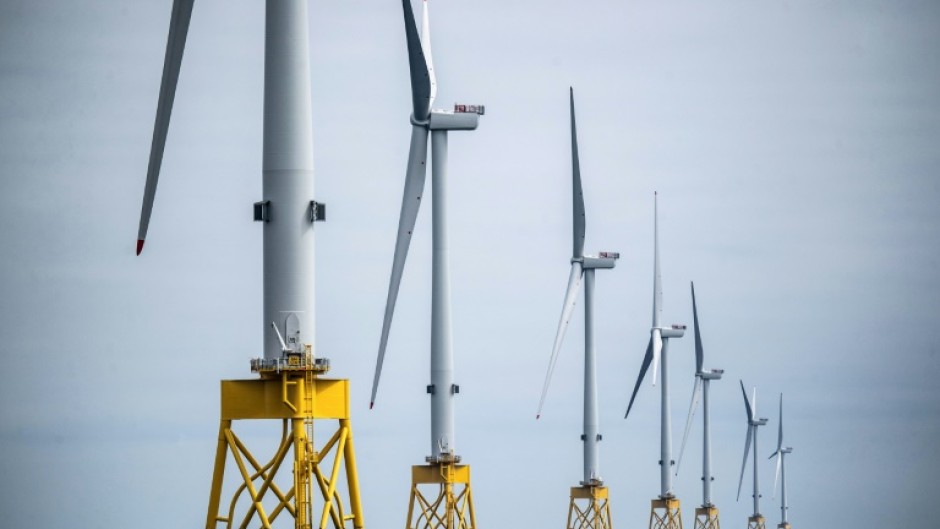PARIS - A world facing catastrophic climate change is perilously off course in meeting goals for slashing carbon pollution and boosting finance for the developing world, according to the UN's first official progress report out Friday.
The 2015 Paris treaty has successfully driven climate action, but "much more is needed now on all fronts," said the report, which will underpin a crucial climate summit in Dubai at the end of the year.
"The world is not on track to meet the long-term goals of the Paris Agreement," including capping global warming at 1.5 degrees Celsius above mid-19th century levels, the report said.
Global greenhouse gas emissions must peak by 2025 and drop sharply thereafter to keep the 1.5C target in view, the so-called stocktake said, drawing from a major scientific assessment by the UN's IPCC science advisory panel.
Achieving net zero carbon emissions by 2050 -- another Paris goal -- will also require phasing out the burning of all fossil fuels whose emissions cannot be captured or compensated.
How quickly to purge the global economy of oil, gas and coal will be hotly contested in December at the two-week COP28 talks in Dubai starting in late November, with nearly 200 nations taking part.
"We need to triple renewable energy by 2030, commercialise other zero carbon solutions like hydrogen, and scale up the energy system free of all unabated fossil fuels," said COP28 president Sultan al-Jaber, head of the United Arab Emirates' national oil company ADNOC.
The stocktake report also says that clean power must be dramatically ramped up, according to the first UN scorecard of the world's progress in meeting Paris Agreement climate goals.

"Scaling up renewable energy and phasing out all unabated fossil fuels are indispensable elements of just energy transitions to net zero emissions," it said.
"Unabated" refers to the absence of any technology that removes carbon emissions, either at the source or from the atmosphere.
Emissions have already peaked in developed and a few developing countries, but are continuing to rise in many of the world's largest economies.
- G20's burden -
With the exception of a dip in 2020 when the global economy slowed due to the Covid pandemic, CO2 emissions have hovered at about 40 billion tonnes a year since 2019.
"We know that the burden of response sits with 20 countries," UN climate chief Simon Stiell, referring to the G20 nations -- holding a summit this weekend in Delhi -- that account for about 80 percent of global emissions.
"The (G20) communiques are woefully inadequate," he added.

China, the United States, the European Union and India alone contribute more than half of total emissions.
"The global stocktake report is a call for radical and immediate action to meet the goals of the Paris Agreement," commented Tom Evans, a policy analyst at climate think tanks E3G.
The stocktake also highlights the need to rapidly and radically scale up financial support to developing nations so they can adapt to climate amplified weather disasters that are already eating away at their economies.
Many African nations, already mired in debt, are struggling to transition away from fossil fuels even as their coffers are drained by worsening droughts, floods, heatwaves and storms.
The report said the global transition to an emission-free world would require trillions of dollars and the "need to transform the financial system" to align with climate priorities.
But it warned that currently hundreds of billions of dollars are still pouring into prop up polluting activities.

It said some $892 billion was invested in fossil fuels annually in 2019 to 2020, with a further $450 billion in fossil fuel subsidies.
Meanwhile, finance for climate action reached $803 billion in the same period, which the report said was around a third of what is needed to curb warming in line with the Paris goals.
The report lands amid growing calls for the World Bank and International Monetary Fund to dramatically redesign their activities to meet the challenges of a warming world.
The first-ever global stocktake "is the moment that all countries say to themselves, 'We will mark our own homework,'" said Evans.
"The decisions and policies we take now will dictate whether we halve emissions this decade," he added. "Any later than this year or next means the window for 1.5C is basically closed."
mh/jm
By Marlowe Hood

